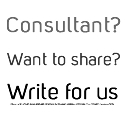Graduates – Thinking of becoming a consultant? Think again
By James. August 27th, 2010. Posted in Your career No Comments »

Becoming a consultant is an attractive and lucrative prospect for many graduates. The good salary, golden handshake, good promotion prospects and project based work all sound great. Recruitment fairs up and down the country are full of recent graduates selling the benefits of being a graduate consultant at many of the top consultancies in the World.
And for many, joining a management consultancy as a graduate is a great move. You get to work with incredibly intelligent people who work hard and take pride in what they do. You get to learn from some of the best people in their fields. You get to work on projects and for clients that no other job could offer you. On top of that you get paid well, you get to travel and you get the chance to gain experience and build a CV that is hard for anyone else to match.
But, and this is a big but, it is not suitable for everyone.
There are some serious downsides to becoming a consultant so early on in your career.
To be a good consultant you need a whole host of skills that can be taught, skills that you will learn on most graduate training courses. But to be a truly great consultant, you also need something that most graduates lack; experience.
Consultants are meant to be experts in their field. Whether that field is software development, organisational change, manufacturing or industrial design as a consultant clients expect you to have experience and expertise. As a graduate, you probably don’t.
Unless you are one of the lucky few that have had to chance to work in industry for some time before or during your degree, you will not have the credibility to have the interesting, exciting roles on client projects straight away. Instead you will be given the less glamourous roles such as minute taker, report writer or researcher, if you’re lucky.
If you’re unlucky, you won’t be on an assignment for most of your first year (if not longer), struggling to get on any project and doing no consulting at all. At the end of that year you will score poorly in your annual appraisal and have nothing of note to add to your CV.
The reality of consulting is that without a reputation for delivering good work you will not get any work of note. And without being given the chance to work on projects of note, you will not be able to build a reputation for delivering good work.
To get ahead as a consultant you need to stand out. You need to have delivered. You need to have experience that sets you apart from everyone else. Few graduates have this.
If you are, or are about to be, a graduate thinking of becoming a consultant think carefully before you jump into the industry.
Do you have enough experience to be considered a true expert? From a career point of view, would you be better off getting some experience of doing a specific job before consulting in that field? Are you prepared to be patient, work on less interesting or exciting assignments in order to build a reputation? Talk to the recruitment people about what their graduates actually get to work on.
Consulting can be a great career for many people, but it’s not a path you should start down without preparing for it to be a rough ride to begin with.
If you are still interested in being a graduate level consultant here are some tips that should help to make your start a flying one:
- Get experience – try to get some experience in the field you’re interested in before joining a firm, do a placement as an intern somewhere as part of your degree. Or get a short term contract one summer to have something other than just your degree on your CV. Do some freelance work if you need to. As as added bonus this experience should help you secure the graduate position at the consulting firm as well as help with your credibility
- Get technical – before starting a job as a consultant try to read up on or do short courses on a very specific technical aspect of what you hope to do, that may be some form of programming, a specific project management technique or a particular change management process, either way become an expert in it, do your research and know your topic. It’ll make you more sellable when it comes to project work
- Get talking – once you’ve started your job as a consultant; network, network, network. Talk to people who sell projects you want to work on, offer your services, offer to do research for proposals etc. Being involved in early proposal and bid work will often lead to a position on the team delivering the project if it is won.
Ultimately a career in consulting can be fantastic, and a hard won graduate place at a top firm should be a great step up the career ladder. Just be prepared for the really hard bit to start after you’ve won the position.
Photo by IMLS DCC





